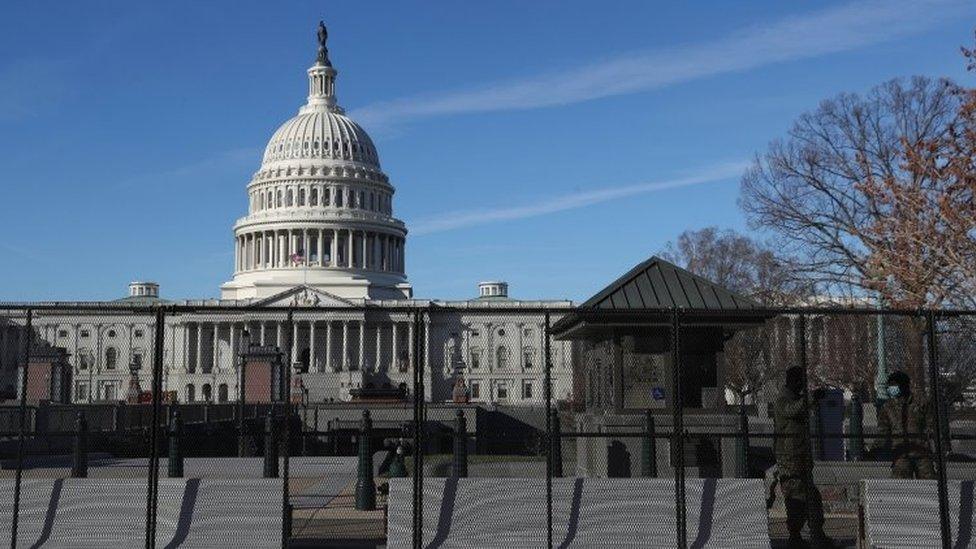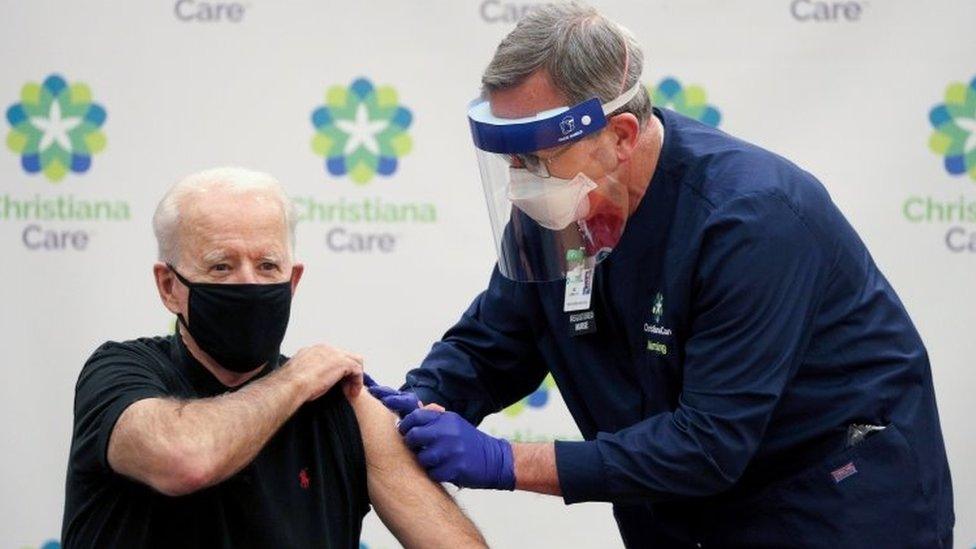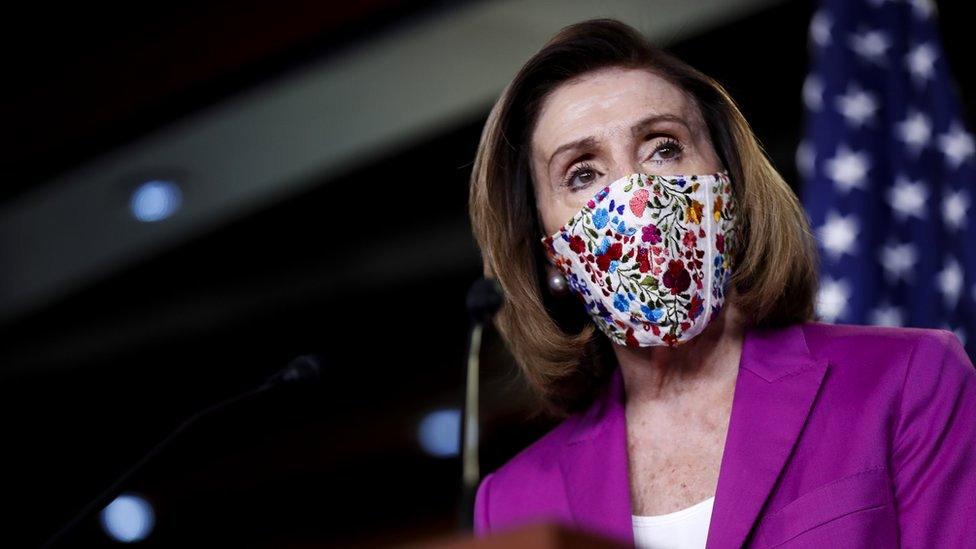Trump supporters planning armed protests ahead of Biden inauguration, FBI warns
- Published

Security has been stepped up at the US Capitol following deadly violence last week
The FBI has warned of possible armed protests across the US as Trump supporters and far-right groups call for demonstrations before Joe Biden is sworn in as president.
There are reports of armed groups planning to gather at all 50 state capitols and in Washington DC in the run-up to his 20 January inauguration.
Security will be tight for the event after a pro-Trump mob stormed Congress.
House Democrats say a vote to impeach the president will happen on Wednesday.
They accuse President Trump of "incitement of insurrection" and say the vote will be held unless Vice-President Mike Pence invokes constitutional powers to remove Mr Trump from office. There is no sign Mr Pence is prepared to do so.
Mr Biden and Vice-President-elect Kamala Harris are expected to be sworn in at a ceremony at the Capitol. The Biden team had already urged Americans to avoid travelling to the capital because of the Covid-19 pandemic, a call that is now being repeated by local authorities.
Security officials have said there will be no repeat of the breach seen on 6 January, when thousands of pro-Trump supporters were able to break into the building where members of Congress were voting to certify the election result.
Speaker Nancy Pelosi walks through Capitol riots damage
Five people died in the riot, which happened after Mr Trump repeated unsubstantiated claims of fraud in the November vote and encouraged his supporters to march on the Capitol.
Since then, calls for Mr Trump's resignation, removal from office or impeachment have grown among Democrats and some Republicans. Mr Trump has made no public statements since he was banned from several social media platforms - including Twitter - on Friday.
He became the third US president to be impeached in December 2019 over charges of breaking the law by asking Ukraine to investigate his rival in the presidential election. The Senate cleared him.

Key dates to watch
Tuesday: The House of Representatives will vote on a resolution calling on Vice-President Pence and the cabinet to invoke the 25th Amendment to declare the president unfit for office and remove him immediately. The resolution is likely to pass as Democrats hold a majority, but Mr Pence has shown no sign he is planning to act
Wednesday: Democrats vow to hold a vote on impeachment. As they have a majority, Mr Trump is likely to become the first president to be impeached twice. The single article of impeachment - a formal charge - will then need to be sent to the Senate where a trial will be held but the timeline is not known
20 January: Joe Biden and Kamala Harris are sworn in as president and vice-president

What further protests are planned?
Posts on pro-Trump and far-right online networks have called for protests on a number of dates, including armed demonstrations in cities across the country on 17 January and a march in Washington DC on inauguration day itself.
An internal FBI bulletin, reported by ABC News and other outlets,, external carries a warning that one group is calling for the "storming" of state, local and federal courthouses around the country if Mr Trump is removed from office early and on inauguration day if he is not.
Capitol riots: ‘We would have been murdered’
Although the violence at the US Capitol dominated headlines last week, similar smaller incidents were also reported elsewhere in the country. Local police agencies have been told by federal law enforcement to increase security at statehouses, according to US media.
FBI warnings are in place for all state capitals from 16 to 20 January itself and in Washington DC at least three days before the inauguration.
Companies and social media networks are cracking down against users and websites seen to be encouraging violence, including social network Parler, which said it was suing Amazon for removing it from its web hosting service.
Twitter said it had suspended more than 70,000 accounts that promoted the Q-Anon conspiracy theory while Facebook said it was banning any content that refers to Stop the Steal, a slogan associated with Mr Trump's claim the election was rigged.
In other developments:
US media report that Mr Trump had a phone call with the House minority leader, Kevin McCarthy, on Monday. According to CBS and Politico, Mr McCarthy told fellow Republicans that Mr Trump had accepted some responsibility for last week's violence while Axios said Mr Trump claimed the loose-knit left-wing group antifa were involved, although there is no evidence of that
Mr Trump is expected to make his first public appearance since the riot on Tuesday, as he travels to Texas to visit a stretch of the border wall with Mexico
On Monday, Mr Trump and Mr Pence met for the first time since the riot, which happened as the vice-president was presiding over certification of the election result. No details have been released of the meeting. Mr Pence had refused Mr Trump's call not to certify the result
What security is planned for the inauguration?
On Monday President Trump declared a state of emergency for Washington DC until 24 January, which enables the Department of Homeland Security (DHS) to act to "avert the threat of a catastrophe".
Chad Wolf, acting head of the DHS, said he had instructed the US Secret Service to begin operations for the inauguration on Wednesday - six days early - "in light of events of the past week and the evolving security landscape".
Later on Monday, Mr Wolf became the third Trump cabinet secretary to step down since the riots, after Betsy DeVos and Elaine Chao. He said his departure had been prompted by "recent events", including court rulings challenging the legal validity of his appointment.
"President Trump could face charges even with a pardon" - Prof Bruce Ackerman from Yale law school
More than 10,000 National Guard troops will be in the capital by the weekend, with about 5,000 more available if requested, Chief of the National Guard Bureau General Daniel Hokanson said. For Mr Trump's inauguration in 2017, about 8,000 National Guard troops were deployed.
Meanwhile, Washington Mayor Muriel Bowser called for more security after what she described as an "unprecedented terrorist attack" at the US Capitol last week.
The National Park Service announced that it has closed the Washington Monument to visitors amid "credible threats" of violence, adding it could also temporarily close areas of the National Mall and Memorial Parks.
Speaking as he got his second Covid-19 vaccine on Monday, Mr Biden said he was "not afraid" to take his oath of office outside despite security fears.

Biden said on Monday he had spoken to some senators about their moves to impeach Donald Trump
After being sworn in as president, Mr Biden is expected to take part in a wreath-laying ceremony alongside former presidents Barack Obama, George W Bush and Bill Clinton to help underscore his message of unity.
Donald Trump has said he will not attend the inauguration - becoming the first president in more than 150 years to refuse to do so.
- Published11 January 2021
